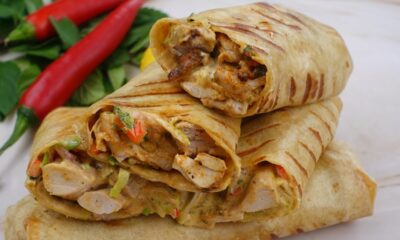Features
Nigeria’s Border Closure & Citizens Deprived of Chicken
Typical of the Nigerian government, they have decided that cutting off the head is the best remedy to a headache.
 When President Muhammadu Buhari closed the Nigerian-Benin border in August 2019 with the intention of reducing the rate of food smuggling into the country, many Nigerians wondered how they were going to survive. The price of rice shot up with about 50%; a derica of rice, which formerly cost 350 Naira, became 500 Naira. The prices of fairly-used wears also went up. In fact, it was reported that Nigeria experienced (or is experiencing) the highest inflation rate since 2018.
When President Muhammadu Buhari closed the Nigerian-Benin border in August 2019 with the intention of reducing the rate of food smuggling into the country, many Nigerians wondered how they were going to survive. The price of rice shot up with about 50%; a derica of rice, which formerly cost 350 Naira, became 500 Naira. The prices of fairly-used wears also went up. In fact, it was reported that Nigeria experienced (or is experiencing) the highest inflation rate since 2018.
Although, the intention of the Nigerian President may have been good, closing the border seems to have done more harm than good. For one, the 90 million people living in ‘extreme poverty’ have been thrown into more poverty. With a bag of rice shooting as high as 28,000 Naira, those who could afford a bag are now opting for half bags of rice.
The border closure has also revealed how dependent Nigeria as a country is on imported goods. With the widely acclaimed ‘ease of doing business’ in Nigeria, it is very glaring that we cannot hold our own when it comes to producing whatever we consume. Did you know that Nigerians import toothpick? Don’t let us digress.
With the many chants of kukurukuu that disturb our morning in Nigeria, it was a shock to many people when they ‘discovered’ that the prestigious Chicken Republic did not have chicken to serve customers on Monday. Apparently, majority of our frozen chicken is being imported.
Why is this happening?
The Nigeria-Benin-Niger borders were closed in an effort to curb the smuggling of rice and many other contraband goods. Typical of the Nigerian government, they have decided that cutting off the head is the best remedy to a headache.
Hameed Ali, the Comptroller General, Nigeria Customs Service (NCS), when making a statement said that by closing the border, Nigeria was able to “completely block the importation of contraband.”
“We are able to completely block the influxes of illicit goods, and most importantly, stopped the exportation of petroleum products which is the biggest problem we have. We’ve also stopped the influx of rice and our rice is now selling. Even those selling garri, that have been abandoned because there was cheap rice, are making brisk business. This is because people are now buying garri as food. So, I think the economy is now picking up and we are grateful for that.” Ali said.
The amusing part of all this is that even a newly-born baby in Nigeria knows that this is not true. For one, the economy is in no way “picking up”. Two, garri is one of the fastest-selling foods in Nigeria; so the idea that “people are now buying garri as food” is moot. Three, although it is agreeable that our local rice is selling better now, the border closure has aided the influx of substandard bags of rice which are still sold at expensive rates. This is because there was no plan put in place to ensure that Nigerians find it easy to produce, preserve, transport, and distribute rice across the nation, before closing the border. This has led to scarcity of food for those who can afford it and starvation for those who cannot.
What should have been done differently?
Nigeria is the 131st country in the World Bank’s 190 economies in the ease of doing business. This means that an average Nigerian still finds it pretty difficult running a business in Nigeria. Asides fighting against the lack of basic infrastructure, poor (or no) power supply, taxes and different levels of agberoism, you have to still fight the government who seems hell-bent on making the lives of the citizens miserable.
A nation with stifled entrepreneurs is a nation that will definitely be low on production. So before you decide to behead Nigerians by closing the border, the ideal thing to have done is to create a conducive environment where Nigerians can hold their own in terms of production.
No light. No road. No water. Taxes here and there – yet you want Nigerians to produce and stop importing. How na? Entrepreneurs who have gone into production are being forced to sell their goods at an expensive rate. By the time you include the cost of production – fuel, transportation, this and that, you will have to sell in a way that you will make gain.
For a country with a majority of poor people, an average Nigerian cannot afford Nigerian-produced goods. The Chinese know this and they have infiltrated the market with cheaper and sub-standard goods. If an average Nigerian-made shoe sells at 6,000 Naira, the Chinese will sell theirs at 2,000 Naira. Instead of buying the Nigerian-made shoes, people would rather buy 3 pairs of the cheaper shoes, so that when one spoils, they will have a back-up shoe.
You cannot ‘force’ people to go into production when you have not created an enabling environment for them. It is just sheer suffering. The plain truth is that for a population of close to 200 million, our production cannot meet our demand. This becomes a survival of the fitness, a ‘na who first see buy go fit chop’ situation.
If you are so keen on stopping the importation of illicit goods, then sweep out corrupt customs officers and put disciplinary measures in place to ensure that they do their jobs well. Na by border closure?
“We burnt 200 bags of fake rice”, “we threw away hundreds of smuggled cars”. Nigerians have alledged that many wives of customs officers all have big big shops – go figure. If the customs officers do their jobs well without collecting bribes and all, we would have less smuggled goods in the country.
The federal government needs to stop making Nigerians suffer for their inability to curb corruption and put certain things in place.
Businesses have been halted, prices of goods have shot up and the people are wailing. What other conviction does the government need before they realize that they have made a terrible decision – even if they had the best intentions?
Poor Nigerians don’t care if they eat Cotonou chicken or Kebbi rice, they only care if the food is edible and affordable.
Besides, isn’t it ironic? Our leaders know how to go foreign when they want to buy cars or take care of their health, but they want Nigerians to buy Nigeria.
If this closure persists, there will be a disruption of the economic lifelines of many traders who depend on legitimate cross-border trade. There will also be a sustained increase in food prices (and we know that in Nigeria, when prices go up, they hardly ever come down). This means that more people will be driven into poverty to add to the already 90 million people on ground. It is quite shameful to have a country with half of its population in abject penury.
Anyway, if you have been planning to make rice and chicken for Christmas, you better start planning on how to make porridge or pounded-yam and efo-riro. It will taste twice as nice.




















